In 2006, the European Commission produced a Green Paper on mental health entitled "Improving the Mental Health of the Population: Towards a Strategy on Mental Health for the European Union" Among the propositions outlined in the Green Paper was one that "Employment opportunities, whether full-, part-time or voluntary can significantly aid peoples' recovery from mental ill-health." The policy of having the Common Fisheries Policy formulated by lunatics was therefore to continue.
And so the idiotic edicts continued to emanate from Brussels, as they had done since the inauguration of the unwieldy undemocratic monstrosity which is the European Union. The more stupid the regulation, the more weight was given to it, as the drafters of the ridiculous rules knew full well that no responsibility for the consequences of their creations would ever attach to them. One rule, fortunately largely ignored, advocated the wearing of hairnets by fishermen while they dealt with their catches. If they could have formulated a procedure whereby fishermen were required to stand on one leg and whistle the Marseillaise as they gutted, this would, no doubt, have been fully sanctioned by the Commission.
Landlocked countries, whose citizens would not know a cod from a codpiece or a haddock from a hole in the wall, are now obliged to vote to decide where our fishing fleets are allowed to catch what, when and how much. In the same manner that the camel is a horse designed by a committee, the commission continues to concoct an annual mishmash of misregulation which does absolutely nothing for stocks conservation, while providing the maximum disruption for our fishermen, who are only trying to earn a living for themselves and their families, as their fathers and grandfathers have done before them. Year after year, our negotiators arrive back from Brussels bearing a bigger can of worms for our fishermen to somehow craft into a workable arrangement. And this is how it will be, until our fishermen, fish-buyers, processors and enforcers get together to throw this unfortunate problem over the side with the discards, and decide our own future - who can fish in the waters around Shetland, how much and when in which areas, and start a sustainable industry for upcoming generations of fishermen.
It's been done before. Britain was on the receiving end from the enforcers of Icelandic fisheries policy during the Cod Wars. And if our politicians back us, we could gain a bit of leverage at the pantomime which is the European fisheries debate by presenting a real threat of action, if what they offer us is useless to our fishermen. But I'm not holding my breath over the resolve of our representatives. They will continue to return, grinning from ear to ear, from negotiations, over the "good deal" they have secured, only for our men on the boats to discover that what they've got is completely unworkable. And the same thing will happen next year, and the year after, until the last syllable of recorded time, to quote Shakespeare out of context.
The Scottish Parliament may have been expected to take up the torch for our beleaguered fishermen, but they have been as totally ineffective as their Westminster counterparts. When our Scottish Nationalist first minister was recently asked to comment on the latest "deal" from Europe, he dismissed the parliamentary criticism, claiming the arrangement was a perfectly good one. When one considers that his constituency contains all the major white-fish ports on the Scottish mainland, this is somewhat surprising, until one remembers that the main aspiration of the Scottish National Party is the political oxymoron of "independence within the European Community". No help there then.
And then there are the marine conservation pressure groups, bodies of like-one-track-minded people, mostly city dwellers, for whom the only ideal future for our marine habitats is a haven for aquatic mammals. For these people, fishermen's livelihoods are a complete irrelevance. Few, if any, of the individual membership of such organisations have ever had to earn a living from land or sea, and yet undue consideration is always given, by the legislative bodies, to their opinions. Given their backgrounds and sound-bite-based education, it is scarcely surprising that their entire ethos is based on the Orwellian assumption that all fishermen are bad people.
I've always had the utmost admiration for Scottish fishermen, who have to work in increasingly murky waters and diffcult conditions, both physically and politically. I've been to sea with fishing boats myself, and I've seen what their crews have to do to earn a crust. They have to be fit, agile and tough to contend with the natural elements, and they are going to have to find another kind of resilience for their battles to retain their living in the future. They will probably have little support from their elected representatives, but, for what it's worth, they have mine.
The Grumpy Old Artist
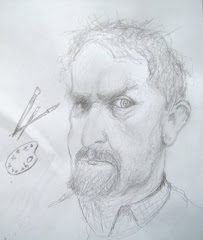
Would YOU pose for this man???
Exhibition Poster

Catterline Event, 2011
Oil Painting by Jim Tait
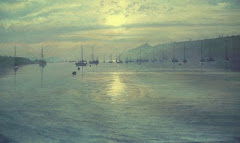
Helford River, Cornwall
Oil Painting by Jim Tait
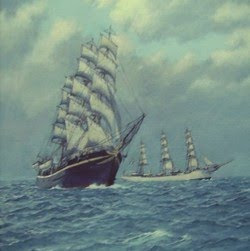
Full-riggers "Georg Stage" and "Danmark"
Other Recent Works
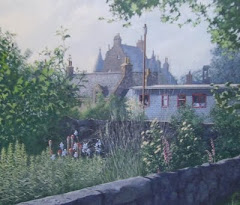
Fordyce Castle and Village

Hay's Dock, Lerwick

Shetland-model Boats at Burravoe, Yell
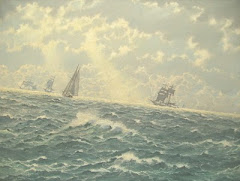
Tall Ships Seascape

The Tour Boat "Dunter III", with Gannets, off Noss
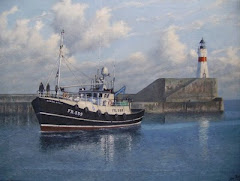
The "Karen Ann II" entering Fraserburgh harbour
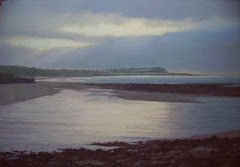
Summer Evening, Boyndie Bay
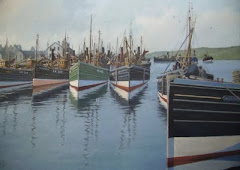
1930s Lerwick Harbour

Johnshaven Harbour
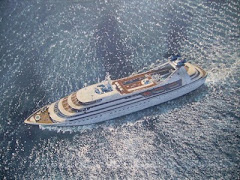
"Seabourn Legend"
Greeting Cards!

Now Available in Packs of Five or in Assorted Sets of Four
Sunday, 26 April 2009
Sunday, 19 April 2009
AUNTIE'S LUMBAGO, HOLIDAY SNAPS AND OTHER COMPLAINTS
I stopped issuing weekly progress reports on my artistic endeavours some time ago. Perhaps I should have continued with these, as they were a chronicle of my artwork, but they were as monotonous to write as they must have been boring to read, so I have sacrificed them to what I hope is a better reading experience for you, the patient blog follower. It must have been a bit like looking at a family member's recent holiday snaps, or hearing the latest bulletin on Auntie's medical condition.
While walking around town, I used to meet a certain lady (sadly no longer with us!) who would give me a daily account of the progression of her West Highland terrier's bowel disorder. As she was thus regaling me, we would sadly watch the poor little dog, its eyes watering and body stiffened in exertion, as it tried to rid itself of whatever was obstructing its system.
Perhaps I exaggerate, in comparing my artistic effusions with the motions of a small dog, but there are people who have expressed an opinion that they differ little in substance, though maybe in greater quantity and fewer words. And, in this hard-won democracy, who am I to disagree?
The Duff House exhibition, scheduled to hang in late June, is progressing well. I have thirteen works completed for it, another three which I hope to have finished within a week, and another at an earlier stage of completion. The final eighteenth work is going to be a magnum opus, of a harbour scene with a large number of fishing boats tied up or at anchor at varying distances from the viewers standpoint. It will take a lot of time and painstaking work, but I am hoping to have it ready for the Banffshire event. I then have another larger, and equally complicated, harbour scene to do for a friend and regular client, a yachtsman from Sweden.
Money is still trickling in, in sufficient quantity to ensure that, thus far, I am weathering the financial recession. I am grateful for the financial help I am receiving from Shetland Islands Council's Economic Development Unit for fares and framing. The Duff House show will determine whether I have a future as a self-employed marine artist or not - it really is as simple as that.
I'll put up the latest completed artworks on the "gallery" part of this blog. Look out for next month's thrilling instalment - and watch where you put your feet!
While walking around town, I used to meet a certain lady (sadly no longer with us!) who would give me a daily account of the progression of her West Highland terrier's bowel disorder. As she was thus regaling me, we would sadly watch the poor little dog, its eyes watering and body stiffened in exertion, as it tried to rid itself of whatever was obstructing its system.
Perhaps I exaggerate, in comparing my artistic effusions with the motions of a small dog, but there are people who have expressed an opinion that they differ little in substance, though maybe in greater quantity and fewer words. And, in this hard-won democracy, who am I to disagree?
The Duff House exhibition, scheduled to hang in late June, is progressing well. I have thirteen works completed for it, another three which I hope to have finished within a week, and another at an earlier stage of completion. The final eighteenth work is going to be a magnum opus, of a harbour scene with a large number of fishing boats tied up or at anchor at varying distances from the viewers standpoint. It will take a lot of time and painstaking work, but I am hoping to have it ready for the Banffshire event. I then have another larger, and equally complicated, harbour scene to do for a friend and regular client, a yachtsman from Sweden.
Money is still trickling in, in sufficient quantity to ensure that, thus far, I am weathering the financial recession. I am grateful for the financial help I am receiving from Shetland Islands Council's Economic Development Unit for fares and framing. The Duff House show will determine whether I have a future as a self-employed marine artist or not - it really is as simple as that.
I'll put up the latest completed artworks on the "gallery" part of this blog. Look out for next month's thrilling instalment - and watch where you put your feet!
Labels:
artwork,
progress,
Small dogs' motions
THE BELLS!
One of the more amusing stories to come out of Lerwick this week concerned our Town Hall clock bells, which have been ringing out faithfully every quarter-hour for as long as I can remember, reminding the burghers of the passage of time whether they wished to be so reminded or not. Apparently, some visitors to our glorious capital have been deprived of sleep because of the nocturnal ding-donging from the Hillhead. So, in the true tradition of white settlers everywhere, they have been attempting to get the authorities to deal with this "problem". In response, in the time-honoured fashion of obsequious, forelock-touching tinhats, our officials have decided that the case of the incomers has to be upheld. Apparatchiks have been drafted in to bring computer technology to bear on the situation, and all sorts of catchy tunes are now going to emanate from the bell-tower, to add an extra campanological dimension to social events in the islands. Mamma Mia! I'm still not clear as to whether the bells will fall silent overnight.
The story reminds me of an event which was reported in the national press a few years ago. It involved a couple of city dwellers, who wanted to get away from the bustle, noise and other nastiness of the city, so they bought themselves a place out in rural Englandshire. Their new next-door-neighbour, as luck would have it, was a farmer, who kept a miscellany of the kinds of animals and domestic fowl which farmers usually keep on a farm. This included a rooster, which did what roosters do at cock-crow, which is - well - crow, on a regular basis. This racket, which was an unfamilar sound to the townies, resulted in a row erupting, between this real-life Boycie and Marilyn, and the farmer, and this dispute ended up in the courts. I did not hear the outcome of the case, but, if it was not decided in favour of the farmer, then natural justice is dead in this country.
I suppose that British settlers are only doing, in these instances, what they've been doing since the beginning of recorded time, which is to colonise. Anything which is not exactly to their liking in their new surroundings must be changed - why on earth should it be otherwise? And the traditional ways of life and doing things in this place must be sacrificed on the altar of these people's pursuit of "the good life". The trouble with colonisation is that the place colonised ends up as a carbon copy of what the colonisers were so desperate to get away from in the first place.
And these islands are saturated with these latter-day "pilgrim fathers" now.
I think I'd miss my nightly ding-dongs, if you pardon the expression. When I wake up on a dark winter's night, and hear a single bar ring out from the "toon haal clock", it's somehow reassuring to know that it's a quarter-past-something. I already have only memories of two sounds which used to echo through the heavy silence of a Lerwick darkness. One, which I do not miss at all, was the mournful "oob" (Look up your Shetland dictionary for that one!) of the Bressay Light foghorn, which kept me wakeful on many a misty night. The other was the explosion of the lifeboat callout maroons, which immediately alerted somnolent Lerwegians to the fact that lives were in danger at sea. Nowadays, in the era of electronic pagers for the lifeboat crews, these brave men put their lives on the line, without the greater population of the town even knowing of their situation. That's a sound I miss.
The story reminds me of an event which was reported in the national press a few years ago. It involved a couple of city dwellers, who wanted to get away from the bustle, noise and other nastiness of the city, so they bought themselves a place out in rural Englandshire. Their new next-door-neighbour, as luck would have it, was a farmer, who kept a miscellany of the kinds of animals and domestic fowl which farmers usually keep on a farm. This included a rooster, which did what roosters do at cock-crow, which is - well - crow, on a regular basis. This racket, which was an unfamilar sound to the townies, resulted in a row erupting, between this real-life Boycie and Marilyn, and the farmer, and this dispute ended up in the courts. I did not hear the outcome of the case, but, if it was not decided in favour of the farmer, then natural justice is dead in this country.
I suppose that British settlers are only doing, in these instances, what they've been doing since the beginning of recorded time, which is to colonise. Anything which is not exactly to their liking in their new surroundings must be changed - why on earth should it be otherwise? And the traditional ways of life and doing things in this place must be sacrificed on the altar of these people's pursuit of "the good life". The trouble with colonisation is that the place colonised ends up as a carbon copy of what the colonisers were so desperate to get away from in the first place.
And these islands are saturated with these latter-day "pilgrim fathers" now.
I think I'd miss my nightly ding-dongs, if you pardon the expression. When I wake up on a dark winter's night, and hear a single bar ring out from the "toon haal clock", it's somehow reassuring to know that it's a quarter-past-something. I already have only memories of two sounds which used to echo through the heavy silence of a Lerwick darkness. One, which I do not miss at all, was the mournful "oob" (Look up your Shetland dictionary for that one!) of the Bressay Light foghorn, which kept me wakeful on many a misty night. The other was the explosion of the lifeboat callout maroons, which immediately alerted somnolent Lerwegians to the fact that lives were in danger at sea. Nowadays, in the era of electronic pagers for the lifeboat crews, these brave men put their lives on the line, without the greater population of the town even knowing of their situation. That's a sound I miss.
Sunday, 12 April 2009
RIPPLES IN THE POND
Strange, isn't it, how one thing can lead to another, rather like the well-worn analogy between one's actions and throwing a pebble into a pond, with the ensuing ripples spreading outwards therefrom. So it was with the picture I painted, a couple of months ago, of the motor boat "Laerling", which was used, up until about ten years ago, as a transport for sightseeing and diving excursions around Shetland. One of her former skippers had commissioned the work and, as usual, I uploaded a JPEG of it to the Tait Gallery website. The boat was sold from Lerwick to Danish owners, and it was they who got in touch, requesting A4 prints of the painting. In a previous existence, I would have provided a negative response to this request, but this time I decided to see if I could accomplish the task they had set me. It involved borrowing the original artwork back from its owner (which I did last Sunday), taking it along to local graphics firm Tay-CAD Ltd (which I did on Monday) to scan it and produce said prints from the scanning. I haven't got the painting or the prints back yet, but I hope to have them soon. I'm making very little profit on this venture, and times have changed to make me go to this amount of trouble for a client. The Tait Gallery now has a can-do attitude - it's official!
ODD SENSATIONS AND NIGHTMARES
A strange inner peace has overwhelmed my savage breast a couple of times this week. I'll have been pottering around the kitchen, with Radio 3 wafting classical music round the place, and a totally alien feeling of quiet contentment has stolen over me. It usually ends, fairly quickly, with an over-boiling pot, a painful crick in my back, forgetting where I've put my glasses, or some other this-worldly occurrence. Then I remember that I'm a struggling artist, partly disabled and working my socks off to keep the wolf from the door in a recession.
Last weekend I dreamt that my sister Thelma and I were in a Chinese restaurant. I was loaded down with a pile of stuff, including a large potted plant, and I was unable to either eat my peking duck or pay the bill because I couldn't offload this heap of rubbish. I inevitably fell out with the staff on account of this, and all the customers, mostly middle-aged men in dark suits, were looking at me rather indifferently. I was glad to wake up from this nonsensical nightmare.
In my nightmares, I'm always trying to accomplish a task which has been set for me, either through necessity or designation by someone else. My attempts at getting this done are doomed to failure by either my own ineptitude or the crowds of people who always populate my dreams. They mill around in a completely unco-operative manner, deaf to anything I try to tell them and the setting is always a completely incongruous version of one of my previous workplaces.
Perhaps I should turn to surrealism.
Last weekend I dreamt that my sister Thelma and I were in a Chinese restaurant. I was loaded down with a pile of stuff, including a large potted plant, and I was unable to either eat my peking duck or pay the bill because I couldn't offload this heap of rubbish. I inevitably fell out with the staff on account of this, and all the customers, mostly middle-aged men in dark suits, were looking at me rather indifferently. I was glad to wake up from this nonsensical nightmare.
In my nightmares, I'm always trying to accomplish a task which has been set for me, either through necessity or designation by someone else. My attempts at getting this done are doomed to failure by either my own ineptitude or the crowds of people who always populate my dreams. They mill around in a completely unco-operative manner, deaf to anything I try to tell them and the setting is always a completely incongruous version of one of my previous workplaces.
Perhaps I should turn to surrealism.
Sunday, 5 April 2009
CONNECTED AGAIN!
I have to report that, after three months of driving a tractor and trailer along the information super-highway, I have my new broadband connection up and running. Yippee -yayyay! Yoicks! I could kiss someone!
When my new BT home hub arrived last Wednesday, I phoned my IT consultant to suggest that I connect it up myself, using the software CD. He screamed:
"DON'T TOUCH IT, JIM!"
I was somewhat disconcerted by this response. Had he no faith in my technological capabilities? Anyway, he arrived next morning, and did the necessary connection, without recourse to the software, in 10 minutes flat.
I've now bought a genuine Rolex replica watch, something which enlarges my body parts, a BA Hons degree from an American university, some bargain software, and medication from a Canadian pharmacy.
ONLY KIDDING!
I have no need of physical enhancement. Not now, anyway - it's far too late for any of that nonsense.
Instead, I'm going to upload some of my latest marine artworks, something which would take all day with the dial-up arrangement. The paintings are all a bit same-ish, as regards subject-matter, I'm afraid, as I'm working to a theme for the forthcoming Duff House exhibition.
When my new BT home hub arrived last Wednesday, I phoned my IT consultant to suggest that I connect it up myself, using the software CD. He screamed:
"DON'T TOUCH IT, JIM!"
I was somewhat disconcerted by this response. Had he no faith in my technological capabilities? Anyway, he arrived next morning, and did the necessary connection, without recourse to the software, in 10 minutes flat.
I've now bought a genuine Rolex replica watch, something which enlarges my body parts, a BA Hons degree from an American university, some bargain software, and medication from a Canadian pharmacy.
ONLY KIDDING!
I have no need of physical enhancement. Not now, anyway - it's far too late for any of that nonsense.
Instead, I'm going to upload some of my latest marine artworks, something which would take all day with the dial-up arrangement. The paintings are all a bit same-ish, as regards subject-matter, I'm afraid, as I'm working to a theme for the forthcoming Duff House exhibition.
Thursday, 2 April 2009
TOURIST AND CHOIRBOY
I had one of my occasional trips to the Scottish mainland last weekend. The purpose was a dual one - firstly, to use my concession travel vouchers with Northlink Ferries, which would have lapsed at the end of March had I not made use of them, and, secondly, to get some photographs of the Mearns and Glenesk areas. These would add to my reference library for future artwork.
The boat trip, on Friday night, was a fairly bumpy affair, on the "Hjaltland", in gale force north-easterly winds, which were touching force 9 as we entered Aberdeen harbour. This was evidenced by the wavetops, which were "blowing smoke".
My brother Peter met me, as arranged, in his Fiesta, and off we set southwards from Aberdeen. The weather was no more conducive to good landscape photography than it was to boat travel, as frequent sleet showers were being driven over us by the gale. However, as the day progressed, the showers died out, the wind taking a bit longer to ease.
Our journey was extensive. We travelled first to Howe o'the Mearns country, and visited the Lewis Grassic Gibbon Centre, where we had our morning cuppa. We also stopped at the ancient Arbuthnott church, before doubling back to Inverbervie, and the fishing village of Gourdon, where I took some photographs from the south side. Southwards we continued, bypassing Johnshaven, and we turned inland south of St. Cyrus towards Fettercairn. It was on this stretch of road that we encountered some of the most inspiring views for me, as an artist. Fields, some freshly ploughed, others green, defined by groves of trees surrounding farmhouses and barns, cascaded away into the blue distance, or to the white-capped foothills of the Highlands, depending which way you looked. The skyline is always dotted with small clumps of trees. More majestic buildings and castles appear in unexpected places, and I feel I could spend the rest of my days painting here, without ever exhausting the supply of inspiring subject matter. The more pleasant of my dreams consist of such scenes, possibly a strange admission from a predominantly seascape painter.
At the Victorian new town of Fettercairn, I photographed the road archway, which had been under scaffolding on my last visit. It is more attractive than the plainer one at Edzell, another Victorian new town, which was our next stop. The scenery here is no less appealing, and my camera was put to good use in this neighbourhood too. We had an excellent lunch at the Panmure Hotel, which was also playing host to a wedding party at the time.
Fortified by our meal, and now in conditions of uninterrupted sunshine, we took the road, past Edzell Castle, which led further up Glenesk. The landscape gradually became less wooded as the road wound upwards. The skyline became one of rounded hilltops, surmounted by single trees rather than the groves farther down. Snow capped some of the higher summits. Somewhere near Bridgend and the ancient pictish Caterthuns, we turned left at a junction and began the descent towards Kirkton of Menmuir, eventually arriving at Brechin. Between here and Friockheim, the road passes through a forest, where we stopped in a lay-by to stretch our legs a bit. I had a cigarette, and the butt joined the collection of squashed milk-bottles, crisp packets and other human detritus which adorned the roadside.
On the other side of Friockheim, Peter confessed to being a little lost, and changed his mind about which road to take a couple of times. The intention was to visit our childhood friend, Kenny Bull, at Auchmithie and, when we arrived at the outskirts of Arbroath, my sibling knew he was back on track. He wished to avoid the town centre, thus simplifying matters as far as driving goes.
Our school chum lives in a converted coastguard station on top of a sheer cliff more than 100 feet high, in the picturesque village of Auchmithie, which is the real home of the Arbroath "smokie". We spent a little time here, Kenny giving us a conducted tour of the village in his elderly 4 x 4. The time was approaching 5pm when we set off back towards Aberdeen, on the coast road, arriving just over an hour later.
I booked into my B & B in Great Western Road (where else?), and had a rest, before contacting my old friend, Alan Johnson, with whom I had arranged to go for a meal at a place of his choosing. More than 35 years ago, Alan and his then girlfriend, my wife and I used to meet up for drinks and jollification at places like the City Bar in Aberdeen town centre. Now, those romantic relationships having long since foundered on the rocks which tend to ensnare them, Alan and I renewed our acquaintance when he bought a painting from my Catterline exhibition last year. He has spent all his working life in the oil industry, and now has his own consultancy firm in Aberdeen. He arrived at my digs at around 8pm, and off we went downtown. He parked at the Chapel Street multistorey, and we set off walking down Union Street, something I once thought I would never do again on a Saturday evening. We had a "chinkie" in the Yangtse River down Bridge Street - very nice it was too.
Union Street has something of a bad reputation nowadays, but we saw no sign of any trouble as we made our way back up at around 10pm. Perhaps it would be a different story at 2 am, when the pubs and clubs were closing. Apart from groups of carousing young girls, dressed in an inappropriate fashion for the freezing conditions, there seemed to be nothing untoward. Alan dropped me off at my digs, and I was soon tucked up in bed, reflecting on an interesting day.
Sunday dawned bright, quiet and fair. I had arranged to meet my brother just before 10am, so, fortified by a typical B & B breakfast, I went with him to Queen's Cross church to "sit in" on his choir practice. I should have known better! I ended up being part of the choir for the second morning service, having had the most cursory rehearsal of an anthem, the music for which I had not set eyes on before that morning. My attire was completely inadequate, my fellow choir-members being whistle-and-fluted and I in my trademark jumper and jeans. Never mind - I enjoyed it immensely. I have not been part of a choir for at least fifteen years, and to break my duck at such a prestigious venue as Queen's Cross was quite an uplifting (as well as terrifying) experience. I managed, just. After the service, there was tea and coffee in the church hall, where I met what seemed to be an endless stream of people who wanted to make the acquaintance of the new choirboy. I made a lot of friends that morning.
Then it was off to the home of my brother and his wife Jenny, where we had a sandwich lunch and relaxed for a bit. My last afternoon on mainland Scotland saw Peter and I driving out to his newly-acquired allotment plot, part of fairly extensive system which commands a spectacular view over Aberdeen harbour entrance. I took a few photographs there, and we went on a final drive down the coast to Stonehaven, where I used the last of my 35mm film (most of the photographs I took the day befire were taken on my digital camera). The next stop was the quayside at Aberdeen, where our farewells were said before I boarded the "Hrossey" for the trip back to Shetland.
The memories of the beautiful landscape near Luthermuir will live with me for some time. Just as well, as many of the photographs I took in that region came out as blanks. I was left with a few shots of Edzell, Gourdon, the Mearns, Fettercairn and Aberdeen Harbour entrance. I had taken a lovely shot of the Fiesta's wheels when I was struck by a gust of wind at Edzell. This was disappointing, but the weekend had been anything but. And the whole thing, including ferry fares, digs and lunch for two at the Panmure Hotel, had come to less than £100. Being over 60 has its compensations!
The boat trip, on Friday night, was a fairly bumpy affair, on the "Hjaltland", in gale force north-easterly winds, which were touching force 9 as we entered Aberdeen harbour. This was evidenced by the wavetops, which were "blowing smoke".
My brother Peter met me, as arranged, in his Fiesta, and off we set southwards from Aberdeen. The weather was no more conducive to good landscape photography than it was to boat travel, as frequent sleet showers were being driven over us by the gale. However, as the day progressed, the showers died out, the wind taking a bit longer to ease.
Our journey was extensive. We travelled first to Howe o'the Mearns country, and visited the Lewis Grassic Gibbon Centre, where we had our morning cuppa. We also stopped at the ancient Arbuthnott church, before doubling back to Inverbervie, and the fishing village of Gourdon, where I took some photographs from the south side. Southwards we continued, bypassing Johnshaven, and we turned inland south of St. Cyrus towards Fettercairn. It was on this stretch of road that we encountered some of the most inspiring views for me, as an artist. Fields, some freshly ploughed, others green, defined by groves of trees surrounding farmhouses and barns, cascaded away into the blue distance, or to the white-capped foothills of the Highlands, depending which way you looked. The skyline is always dotted with small clumps of trees. More majestic buildings and castles appear in unexpected places, and I feel I could spend the rest of my days painting here, without ever exhausting the supply of inspiring subject matter. The more pleasant of my dreams consist of such scenes, possibly a strange admission from a predominantly seascape painter.
At the Victorian new town of Fettercairn, I photographed the road archway, which had been under scaffolding on my last visit. It is more attractive than the plainer one at Edzell, another Victorian new town, which was our next stop. The scenery here is no less appealing, and my camera was put to good use in this neighbourhood too. We had an excellent lunch at the Panmure Hotel, which was also playing host to a wedding party at the time.
Fortified by our meal, and now in conditions of uninterrupted sunshine, we took the road, past Edzell Castle, which led further up Glenesk. The landscape gradually became less wooded as the road wound upwards. The skyline became one of rounded hilltops, surmounted by single trees rather than the groves farther down. Snow capped some of the higher summits. Somewhere near Bridgend and the ancient pictish Caterthuns, we turned left at a junction and began the descent towards Kirkton of Menmuir, eventually arriving at Brechin. Between here and Friockheim, the road passes through a forest, where we stopped in a lay-by to stretch our legs a bit. I had a cigarette, and the butt joined the collection of squashed milk-bottles, crisp packets and other human detritus which adorned the roadside.
On the other side of Friockheim, Peter confessed to being a little lost, and changed his mind about which road to take a couple of times. The intention was to visit our childhood friend, Kenny Bull, at Auchmithie and, when we arrived at the outskirts of Arbroath, my sibling knew he was back on track. He wished to avoid the town centre, thus simplifying matters as far as driving goes.
Our school chum lives in a converted coastguard station on top of a sheer cliff more than 100 feet high, in the picturesque village of Auchmithie, which is the real home of the Arbroath "smokie". We spent a little time here, Kenny giving us a conducted tour of the village in his elderly 4 x 4. The time was approaching 5pm when we set off back towards Aberdeen, on the coast road, arriving just over an hour later.
I booked into my B & B in Great Western Road (where else?), and had a rest, before contacting my old friend, Alan Johnson, with whom I had arranged to go for a meal at a place of his choosing. More than 35 years ago, Alan and his then girlfriend, my wife and I used to meet up for drinks and jollification at places like the City Bar in Aberdeen town centre. Now, those romantic relationships having long since foundered on the rocks which tend to ensnare them, Alan and I renewed our acquaintance when he bought a painting from my Catterline exhibition last year. He has spent all his working life in the oil industry, and now has his own consultancy firm in Aberdeen. He arrived at my digs at around 8pm, and off we went downtown. He parked at the Chapel Street multistorey, and we set off walking down Union Street, something I once thought I would never do again on a Saturday evening. We had a "chinkie" in the Yangtse River down Bridge Street - very nice it was too.
Union Street has something of a bad reputation nowadays, but we saw no sign of any trouble as we made our way back up at around 10pm. Perhaps it would be a different story at 2 am, when the pubs and clubs were closing. Apart from groups of carousing young girls, dressed in an inappropriate fashion for the freezing conditions, there seemed to be nothing untoward. Alan dropped me off at my digs, and I was soon tucked up in bed, reflecting on an interesting day.
Sunday dawned bright, quiet and fair. I had arranged to meet my brother just before 10am, so, fortified by a typical B & B breakfast, I went with him to Queen's Cross church to "sit in" on his choir practice. I should have known better! I ended up being part of the choir for the second morning service, having had the most cursory rehearsal of an anthem, the music for which I had not set eyes on before that morning. My attire was completely inadequate, my fellow choir-members being whistle-and-fluted and I in my trademark jumper and jeans. Never mind - I enjoyed it immensely. I have not been part of a choir for at least fifteen years, and to break my duck at such a prestigious venue as Queen's Cross was quite an uplifting (as well as terrifying) experience. I managed, just. After the service, there was tea and coffee in the church hall, where I met what seemed to be an endless stream of people who wanted to make the acquaintance of the new choirboy. I made a lot of friends that morning.
Then it was off to the home of my brother and his wife Jenny, where we had a sandwich lunch and relaxed for a bit. My last afternoon on mainland Scotland saw Peter and I driving out to his newly-acquired allotment plot, part of fairly extensive system which commands a spectacular view over Aberdeen harbour entrance. I took a few photographs there, and we went on a final drive down the coast to Stonehaven, where I used the last of my 35mm film (most of the photographs I took the day befire were taken on my digital camera). The next stop was the quayside at Aberdeen, where our farewells were said before I boarded the "Hrossey" for the trip back to Shetland.
The memories of the beautiful landscape near Luthermuir will live with me for some time. Just as well, as many of the photographs I took in that region came out as blanks. I was left with a few shots of Edzell, Gourdon, the Mearns, Fettercairn and Aberdeen Harbour entrance. I had taken a lovely shot of the Fiesta's wheels when I was struck by a gust of wind at Edzell. This was disappointing, but the weekend had been anything but. And the whole thing, including ferry fares, digs and lunch for two at the Panmure Hotel, had come to less than £100. Being over 60 has its compensations!
Subscribe to:
Comments (Atom)








